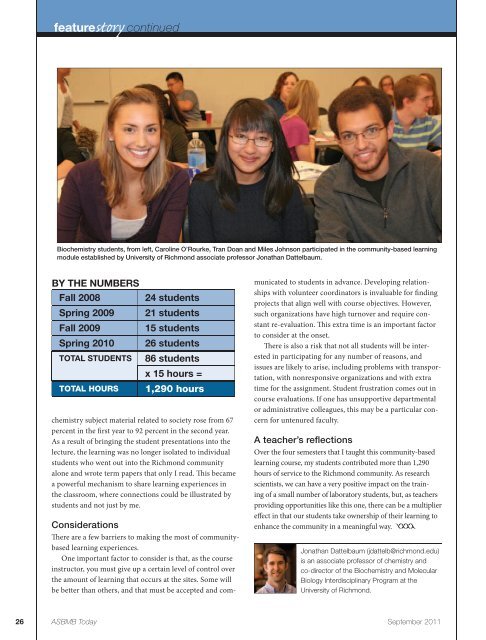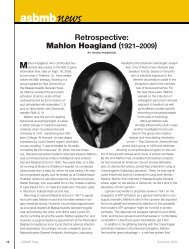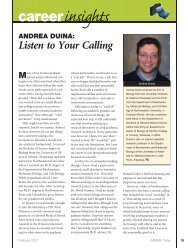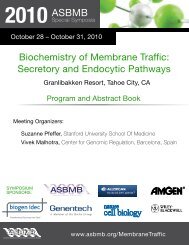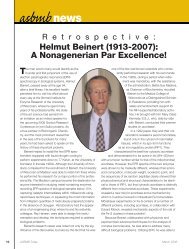asbmbnews
asbmbnews
asbmbnews
Create successful ePaper yourself
Turn your PDF publications into a flip-book with our unique Google optimized e-Paper software.
featurestory continued<br />
Biochemistry students, from left, Caroline O’Rourke, Tran Doan and Miles Johnson participated in the community-based learning<br />
module established by University of Richmond associate professor Jonathan Dattelbaum.<br />
By THe NUMBeRS<br />
Fall 2008 24 students<br />
Spring 2009 21 students<br />
Fall 2009 15 students<br />
Spring 2010 26 students<br />
TOTAl STUDeNTS 86 students<br />
x 15 hours =<br />
TOTAL HOURS 1,290 hours<br />
chemistry subject material related to society rose from 67<br />
percent in the first year to 92 percent in the second year.<br />
As a result of bringing the student presentations into the<br />
lecture, the learning was no longer isolated to individual<br />
students who went out into the Richmond community<br />
alone and wrote term papers that only I read. This became<br />
a powerful mechanism to share learning experiences in<br />
the classroom, where connections could be illustrated by<br />
students and not just by me.<br />
Considerations<br />
There are a few barriers to making the most of communitybased<br />
learning experiences.<br />
One important factor to consider is that, as the course<br />
instructor, you must give up a certain level of control over<br />
the amount of learning that occurs at the sites. Some will<br />
be better than others, and that must be accepted and com-<br />
municated to students in advance. Developing relationships<br />
with volunteer coordinators is invaluable for finding<br />
projects that align well with course objectives. However,<br />
such organizations have high turnover and require constant<br />
re-evaluation. This extra time is an important factor<br />
to consider at the onset.<br />
There is also a risk that not all students will be interested<br />
in participating for any number of reasons, and<br />
issues are likely to arise, including problems with transportation,<br />
with nonresponsive organizations and with extra<br />
time for the assignment. Student frustration comes out in<br />
course evaluations. If one has unsupportive departmental<br />
or administrative colleagues, this may be a particular concern<br />
for untenured faculty.<br />
A teacher’s reflections<br />
Over the four semesters that I taught this community-based<br />
learning course, my students contributed more than 1,290<br />
hours of service to the Richmond community. As research<br />
scientists, we can have a very positive impact on the training<br />
of a small number of laboratory students, but, as teachers<br />
providing opportunities like this one, there can be a multiplier<br />
effect in that our students take ownership of their learning to<br />
enhance the community in a meaningful way.<br />
Jonathan Dattelbaum (jdattelb@richmond.edu)<br />
is an associate professor of chemistry and<br />
co-director of the Biochemistry and Molecular<br />
Biology Interdisciplinary Program at the<br />
University of Richmond.<br />
26 ASBMB Today September 2011


